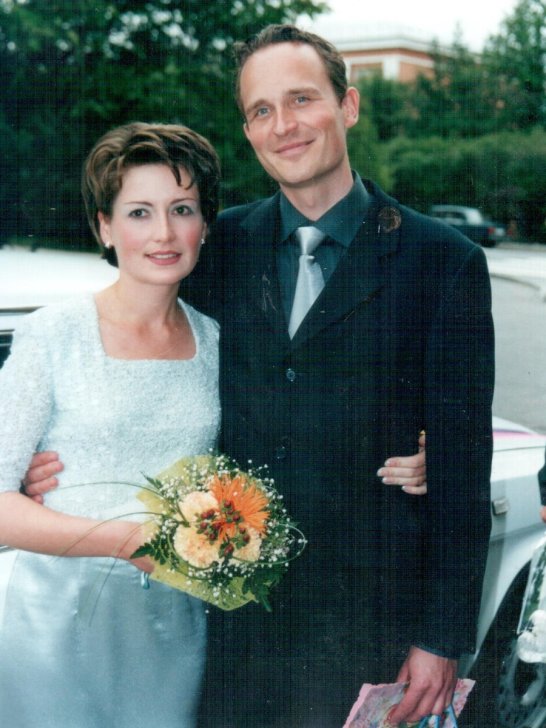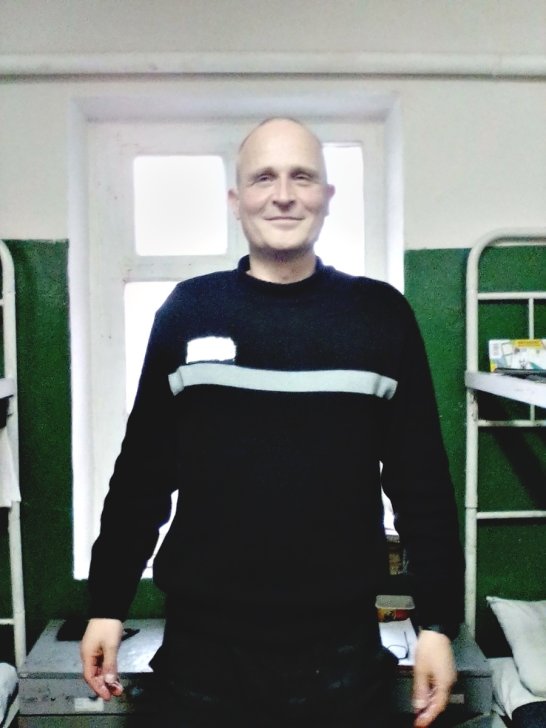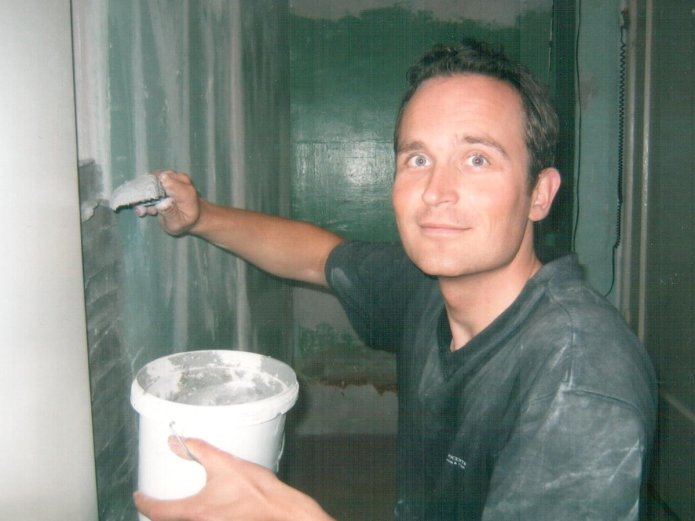On May 25, a Danish citizen Dennis Christensen was released after five years behind bars. In 2019, after two years spent in a pre-trial detention center, the court sentenced him to six years of imprisonment under the Article 282.2 Section 1 on «Organizing the activity of an extremist organization». OVD-Info tells his story.
Saint-Petersburg — Murmansk — Oryol
A Jehovah’s Witness from Denmark Dennis Christensen came to Russia in November 2000. He arrived in Saint-Petersburg by plane, spent a few days in the local community of Jehovah’s Witnesses and set off by train to preach in Murmansk. There he joined the local congregation of the Jehovah’s Witnesses. Dennis grew to like the city and decided to stay in Russia.
«The people are wonderful, and the weather is magnificent — polar day and polar night. I felt at home in Russia. I don’t know how to explain it, but I felt free. The people are more open and sociable. It doesn’t matter if you are poor or rich, they accept you as a human. It attracted me a lot. The Danish are also very friendly, but the Russians are way more open, ” Christensen recalls with a smile.
There was a young woman named Irina in the community where Dennis served. As he himself admits, he fell in love with her at first sight. They became friends and went to preach together, talked to people about the Bible, and two years later they got married. In the beginning, they lived in a communal apartment of 11 square meters, but later they moved to their own apartment. Dennis is a carpenter by profession, «like Jesus», and in Russia he continued to practice this craft, while studying home renovation at the same time. He realized that in Russia it was necessary to be able to provide turnkey renovations, while niche specializations were not in demand. In 2006, Dennis and Irina moved to Oryol.
«It was a bit more difficult in Oryol, the people were not used to foreigners, and they would straight away decide that I was a spy. I had to explain that I was an ordinary person. I planned to live there for the rest of my life, ” says Dennis.

Dennis Christensen with his wife Irina / Photo from Christensen’s personal archive
In the congregation, he served as an elder– that is what Jehovah’s Witnesses call the spiritual leaders of communities. In each congregation there is a council of the elders who can be in charge of the congregation, but not of the «faith of others», Christensen specifies.
Back in 2014 Dennis started to notice that «the screws were being tightened more and more» in Russia. Similarly dressed people filming the religious services on hidden cameras began to appear at conventions of Jehovah’s Witnesses, where thousands of believers gathered.
«Two men in plain clothes, dressed the same way, filming with anything. It could be [a hidden camera that looked like] a pack of cigarettes — Jehovah’s Witnesses don’t smoke. They would go to the parking lot and copy the license plate numbers of the cars, ” Christensen recalls.
When in April 2017 the «Administrative Center of Jehovah’s Witnesses in Russia» and several hundred communities across the country were recognized as extremist organizations, the believers began to ask Dennis what to do in case the police came to them. He replied that there was nothing to be afraid of, because they were a religious group, and not a local religious organization (LRO), therefore, they did not have to report on their activities. Later on, the wiretaps of these conversations appeared in the criminal case, but the court did not consider them sufficient proof of innocence.
«In 2016 the LRO «Jehovah’s Witnesses Oryol» was liquidated. «It was a real legal entity, which had about ten members, ” says Dennis Christensen’s lawyer Anton Bogdanov. «The ratio between them and the believers is the same as between the founders of the legal entity of any church or mosque and its parishioners — the believers are many times more numerous. Jehovah’s Witnesses kept on studying the Bible, singing religious songs, and praying. The FSB charged them with continuing the activities of the LRO, although it is not what they were, as Christensen asserted even in the wiretaps. The logic of the prosecution was as follows: if you are gathering, then you are an LRO. Why an LRO? Because you need to be imprisoned.»
«Thus, in a tie, jacket, and shirt, I ended up in the criminal world»
On May 25th, 2017, Dennis Christensen came to a church service with his wife. The believers were reading the Bible, and then Dennis heard a noise from the street and thought that the police had come, but he did not interrupt the service. Later he was asked to go out into the corridor — the FSB special forces were waiting there.
«I told them that the church service must not be interrupted, that it is sacred. But talking to the FSB is like talking to a door. We had to stop the congregation. They started talking to the parishioners and informed me that I was detained. I went around calming everyone down, asking the investigator to let people go. At last, almost everyone was allowed to go, there were about twenty people left. After the searches were over, I was taken to several police stations for interrogation and fingerprinting. They handcuffed me as if I were the number one enemy of the state. It was very funny to me and a little offending. I thought about how much time, effort and money was being wasted. That same evening, the court sent me to a pre-trial detention center for two months. Thus, in a tie, jacket, and shirt, I ended up in the criminal world, ” Dennis recalls.
According to Christensen, the window of the pre-trial detention cell offered a beautiful view of the park and five-story buildings — he calls it «a piece of freedom.» The prospect of serving a two-month detention time did not frighten him: he was sure that the court would soon figure everything out and he would be allowed to go home.
«Many Jehovah’s Witnesses before me were imprisoned all over the world. I’m not the first. My lawyer advised me not to worry, he saw no reason to keep me in pre-trial detention. I was very naive. Six months later, I realized that everything had been decided for me and that all my arguments and the arguments of the lawyers played no role in this process. They insisted all the time that I would run away, and it was the only thing that the court took into account, leaving me in custody. It was then that I understood that they would put me in prison. I would be in detention there until the end of the trial, and then I would also serve prison time. They wanted me to cooperate with the investigation, but I refused because I knew I was innocent. I even knew the prison time — six years. For some reason I was sure that they would give the minimum prison time. If I were guilty, I would have gotten all ten, ” he reasons.
During the two years spent in the pre-trial detention, Dennis received letters from people from all over the world and read Russian classics and memoirs of Gulag prisoners — he was trying to understand how the Russian prison worked and how those who were there before him felt. He was charged with organizing the activity of an extremist organization. According to the investigators, he continued the activity of the LRO «Jehovah’s Witnesses Oryol» after its liquidation.
The charges were based on the recordings of wiretapped church services and the testimony of a secret witness «Yermolov», other witnesses were not aware of the closure of the LRO. Christensen’s lawyer Anton Bogdanov claims that the person hiding under the pseudonym was Oleg Kurdyumov, a lecturer at the Oryol State University, with whom Dennis communicated multiple times and who recorded all their conversations on a hidden camera fixed by FSB officers in his clothes.

Dennis Christensen in Correctional Labour Camp 3 in Kursk Oblast / Photo from Christensen’s personal archive
According to Yaroslav Sivulskiy, a representative of the European Association of Jehovah’s Witnesses, the prosecution of Christensen was unexpected for the organisation:
«Christensen’s case is unusual. It seemed that foreigners wouldn’t сome into the field of view of security officers. No one thought that they would follow the tough scenario. When the search in Oryol happened, it became apparent that all of those optimistic prognoses failed, and the authorities started on the course to seriously prosecute religious believers. From that moment, the situation only worsened. I remember Vladimir Putin stating that Witnesses are Christians and shouldn’t be prosecuted. Then Surgut happened right away, where people were tortured right inside the building of the Investigative Committee. Dennis became the exemplary prisoner, on whom security services worked out the methodologies of not just the searches, but also the methodology of proving guilt in court.»
According to Sivulskiy, the situation regarding the persecution of believers is «consistently bad». 640 people ended up in the field of view of security services: they were searched, interrogated, sent to labour camps or ended up in Rosfinmonitoring’s list of terrorists and extremists. On the 1st of October, there were 100 imprisoned Jehovah’s Witnesses, 128 that received suspended sentences, and 24 that were fined. Eight believers were acquitted. The number of searches surpassed 1800. The legal investigation often uses anonymous witnesses that cannot answer clarifying questions. Security services implement secret surveillance in believers’ houses, infiltrating them in their absence or under the guise of internet provider workers.
«It’s very difficult to protect yourself against those methods. Jehovah’s Witnesses face persecution with dignity. After the death of Jesus in Jerusalem, apostles began to be persecuted. They were accused of filling Jerusalem with their teachings. Then apostles Peter and John said ‘Judge whether it is fair before God to listen to you more than to God’. When Christians are given this choice, they do not choose the authorities, although they respect them. At least until their faith isn’t forbidden, and they themselves are imprisoned. Believers understand that their prosecution is inevitable. After all, Jesus was amongst those prosecuted and even killed, and apostles Paul and Peter were in jail, ” says Sivulskiy.
In the vast majority of countries around the world, Jehovah’s Witnesses operate entirely legally. However, their operations are banned in China, North Korea, Iran, Iraq, Saudi Arabia, Eritrea and Russia. In 2017, the Ministry of Justice appealed to the Supreme Court of the Russian Federation with the request to abolish the «Jehovah’s Witnesses’ Administrative Centre», recognise it as an extremist organisation and to forbid the centre from operating on the territory of Russia. The formal grounds were the violation of anti-extremist legislation.
Furthermore, government-controlled media channels also discussed the ban on blood transfusion held by Jehovah’s Witnesses. According to representatives of the religious movement, blood is sacred in the eyes of God and you cannot use it in any way, as it contains parts of the human soul.
«In the Bible, there is a direct ban on the consumption of blood, no one disputes that. Yes, this is why Jehovah’s Witnesses refuse donor blood transfusions but utilise other, more modern methods and medicines. The subject of transfusion was touched upon at least three times by ECHR, for example in the case of ‘Jehovah’s Witnesses of Moscow vs the Russian Federation’, and every time the court stood on the side of the believers. Jehovah’s Witnesses cherish life as God’s gift and therefore lead a healthy lifestyle. If a need for medical treatment arises, they search for the most qualified help and make their own decisions, knowing their responsibility before God. In our times, blood transfusion isn’t the only option without other alternatives. In every treatment method, including blood transfusion, there are pros and cons, probabilities and risks. This is why legislation, including Russian legislation, secures the patient’s right to make an informed final decision. This is why the court’s decision to liquidate Jehovah’s Witnesses’ communities does not mention blood transfusion or the lack thereof. These are fundamental human rights to the inviolability of private life, ” Sivulskiy explains.
In April 2017, the Supreme Court approved the claim of the Ministry of Justice, therefore banning the activity of Jehovah’s Witnesses’ communities on the territory of Russia.
Russian human rights organisations regard the prosecution of Jehovah’s Witnesses as unfair. The Informational-analytical centre «Sova» called multiple times for the Russian authorities to «cancel the discriminatory decision regarding the ban of Jehovah’s Witnesses and to reject the practice of prosecution of the proponents of this religion» and to «reconsider their politics regarding protestant organisations and new religious movements, as the observed legitimisation of ‘anti-sectarian’ moods not only opposes the principle of freedom of conscience, but also threatens public safety».
Human rights centre «Memorial» recognised the accused Jehovah’s Witnesses as political prisoners. Subsequently, even the President of Russia, Vladimir Putin called the prosecution of Jehovah’s Witnesses «complete nonsense», and said that he doesn’t understand why they are being prosecuted. This, however, did not change the practice in any way.
«I told them: I am not a traitor, I am not a bitch»
On the day the verdict was to be announced, Dennis was transported to the courthouse and asked not to speak to anyone, as too many people came. But he refused, as he considered the day of the verdict as the day when the whole world should learn about Dennis Christensen. There were 50 people in the courtroom that day, three times as many people remained outside.
«I saw that everyone became a little bit sadder, even before the moment the translator told me the verdict, ” Dennis remembers. «I immediately understood that I got six years. This did not come as a surprise. I knew that everything was predetermined. I could scream, cry, dance, sing songs. They didn’t care. They only pretended to listen to me. The theatre was immediately apparent. I’ve had enough of it. I was ashamed that I was a part of this performance.»
Dennis says that he was waiting to be sent to a labour camp as he hadn’t seen his wife for two years, except from behind glass. After the verdict, Christensen was transported from the Oryol pre-detention facility to the one in Kursk.
«I told them: I am not a traitor, I am not a bitch. Then I was immediately sent to the solitary punishment cell. There I spent a great five days in isolation. When I arrived at the camp and got quarantined, I realised that the sole goal of employees there is to break you. They hit some people and only threatened others. One person agreed to cooperate after getting slapped. The deputy chief there was a huge, powerful man, he was called Igor Nikolaevich Myasnyankin. We found a common language with him: I didn’t touch him, and he did not touch me. In prison, you need to shut your mouth and exist underneath the floorboards. I couldn’t do that. When I see injustice, I can’t turn a blind eye to it. But I wasn’t like Che Guevara. I was fighting only for myself, ” says Dennis.

Dennis Christensen / Photo from Christensen’s personal archive
The prison’s administration banned Christensen from preaching his religion or even discussing it with other inmates. He refused to comply with the order, citing article 28 of the Constitution of the Russian Federation, which guarantees freedom of thought and freedom of religion.
«We talked a lot about spirituality. Both Christians and Muslims alike sought it out. I can’t say I preached in prison, but we discussed a lot, especially with those interested. Sooner or later, people realized I was imprisoned for my faith, and they wanted to learn more. I often turned to Bible passages when someone wasn’t doing well or when someone lost a loved one. The Bible has plenty of things to say about that. People in prison live without hope and struggle to see any meaning in life. The Bible was my way of cheering them up, ” Christensen says.
In his barrack, Dennis got especially close with Muslim inmates from Dagestan and Chechnya. According to him, faith helped them the same way as it did him. They were all convicted of «participating in unlawful armed organizations» and terrorism. Christensen was twice as old as most of them, and they treated him like an older brother. Dennis says he still misses them. He worries that with charges like terrorism, they will not have a future upon release.
«They protected me from various problems. Who wants to deal with terrorists in prison, right?» he jokes.
Dennis spent the first month in the general population until the prison’s administration showed up at his barrack with a search. The warden, Denis Kosarev, turned on the camera, opened Dennis’ cabinet, and, having shuffled around for a moment, pulled out a small knife. Christensen believed the knife had been planted on him in an attempt to sabotage his application for parole. His cellmates laughed, citing similar occurrences as common practice.
«Everyone must take responsibility for their actions. But that is not the goal of this system. It is designed in the military way. Any order, however criminal, must be followed if the commander says so, ” Dennis states.
«Dennis Christensen isn’t going anywhere»
A year into his prison term, in June 2020, Dennis requested his sentence be commuted and replaced with a fine. The court found a 500,000 rubles’ fine to be a sufficient alternative to prison time. Dennis was finally free to go.
«The whole world had learned of Dennis Christensen’s courtroom win. I would be going home, and I was over the moon. Two days later, the warden and chief of security came to search our barrack. I was in the kitchen, looking for food with some others. We were not allowed to be there at the time. Though I wasn’t the only inmate there, I was the only one ordered to leave. It was sweltering. I remember we all were wearing t-shirts. The next day, the warden informed me of two reports written up against me for breaking procedure. I was sent to solitary confinement for ten days. I thought I was still set to go home in eight days. Then, I received the notice. A higher-up prosecutor had appealed the court’s ruling. I put two and two together and realized: Dennis Christensen isn’t going anywhere, ” Dennis recalls.
The prosecutor’s appeal was upheld, and Dennis went back to his cell from solitary confinement. After his 5th time in solitary, in October 2020, Christensen was transferred to a maximum security prison. «To join the people with the highest authority in the criminal world, ” he clarifies.
«I had a good life at the maximum security prison; there was a spirit of freedom there. I lived among the people who were free on the inside. The inmate leader told me to live there like I would on the outside. They knew I was a Jehovah’s Witness and knew us as quiet and peaceful folk. They didn’t understand why I was found to be an extremist. I talked with everyone and was friendly with everyone. I didn’t wear a mask or pretend to be tough. I stated that I had my principles and my faith and that my actions would be guided by them.»
The injustice he faced in prison weighed down on Dennis. In both maximum security colony and solitary confinement, he was not allowed to call his wife or talk with his sister. He says that saddened him, but he tried to keep his faith and positive attitude:
«Stalin is long gone. Russia has now been here for 30 years. Why do they still follow the system he’d built? Why do these people think they can do anything they wish, enslave their inmates? That was what I couldn’t understand. It depressed me, but I didn’t lose my faith. I always remembered I was innocent, and I never broke any laws. My faith grew stronger in prison. I knew I would be helping others learn about God when I got out. I knew they would easily break me if I lost my joy. Joy is our backbone. I am generally a happy person; I smile often. Other inmates noticed that and named me the happiest man in prison.»
Dennis didn’t feel alone in prison. He had his inmate friends to talk to, and he was receiving many letters. He was trying to respond to three letters a day. Dennis says he will always be grateful for the support from strangers around the world.
Fifty days before his release, Dennis felt he’d caught the «illness of freedom». He feared he wouldn’t find his place in the world once out. Other inmates remember being envious of his state and waiting to experience it themselves.
The morning of his release, Christiansen was told by a Federal Penitentiary Service officer that many people were waiting for him outside with balloons. He was subsequently cuffed and driven off the prison’s premises, bypassing the crowd of greeters. He waved at them through the back window of the car. By 8 p.m. on Wednesday, May 25, he was at the airport boarding a plane to Moscow where he would catch a connecting flight to Denmark. The court had ordered Dennis’s deportation and banned him from entering Russia for eight years. After an airport pizza dinner with his wife and attorney, Dennis flew home.
***
Dennis Christensen never regretted moving to Russia. To this day, he considers it the best decision of his life. He says that he genuinely loves Russian culture and Russian people, and that in prison, he fought fear with the help of God, who was always with him «like he was with other imprisoned Jehovah’s Witnesses.»
Dennis now lives in Denmark with his wife Irina and his father. Irina has decided to cease talking to journalists. Years of interviewing while Dennis was incarcerated were taxing enough. This year, the two are celebrating their 20th anniversary; and they jokingly wonder if the five years Dennis spent in prison should count.
Dennis hasn’t returned to his carpentry work yet. Since returning from prison, he has been having trouble sleeping and is now learning to rest again.
«No grand plans for now, ” Dennis tells us. «I just want to reenter society, I want to support others. Any experience you get can be of use to you; and I believe those five years were not in vain. They didn’t enrich me, and they took away a lot of my life, but I did not give up. I came back more resilient. My faith grew stronger, and my eyes were opened. I learned a lot and met many wonderful people. I don’t want to lose this joy. I want to continue fighting evil with good.»
Gleb Golod



